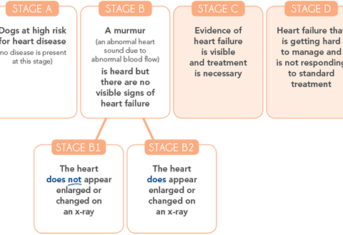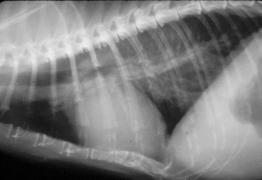Celebrate American Heart Month with your Pet

Celebrate American Heart Month with your Pet
Valentine’s Day was last weekend and that holiday has me thinking of hearts. I’m not thinking of the chocolate-covered marshmallow type (although I gratefully accepted all bestowed upon me) – I’m thinking about the heart health of your favorite fur person. It’s a timely thought since the National Institutes of Health’s Heart, Lung and Blood Institute has declared February American Heart Month.
All Hearts are Not the Same
For a healthy heart, your doctor recommends you stop smoking, exercise daily, control your blood pressure and maintain a healthy body weight by eating a healthy diet. These risk factors for human heart disease do not play as large a role in pet heart health, but they are still relevant. Pets can be victims of secondhand smoke, making smoking cessation beneficial to both you and your pet. Hypertension is not associated with heart disease in animals, but veterinarians do treat high blood pressure in pets with kidney disease. Pets don’t have heart attacks from coronary artery blockage; however, being overweight puts extra stress on your dog or cat’s heart and joints.
Feline Heart Disease: A Muscular Problem
Hypertrophic cardiomyopathy, or HCM, is the major heart disease of cats. In this disorder, the heart muscle becomes very thick and does not pump blood effectively. Fluid backs up into the lungs, a phenomenon known as pulmonary edema from congestive heart failure. HCM can be a silent killer. Many families don’t know their cat has HCM until their cat’s breathing becomes labored. HCM can also result in sudden death from abnormal heart rhythms. To learn more about HCM, read about Sydney the cat.
Canine Heart Disease: Bad Valves
In dogs, the most common form of heart disease involves abnormal heart valves. Canine chronic valve disease is present in about 10% of adult dogs and is more common in small breed dogs than larger ones. When the valves of the heart are not normal, blood leaks through the valves. The leak results in turbulent blood flow, which can be detected with a stethoscope as a heart murmur. Veterinarians grade heart murmurs according to how loud they are. The grade of a heart murmur does not predict if a dog will experience congestive heart failure. Assessing the severity of heart disease requires a physical examination, a chest x-ray, an EKG and possibly an echocardiogram or an ultrasound of the heart. Once the severity of heart disease is determined, the cardiologist can prescribe medications appropriate to that stage of disease.
Happy Valentine’s Day and a healthy American Heart Month to all. Remember, chocolate will send your dog’s heart racing, so keep all the chocolate-covered marshmallow hearts for yourself!

































